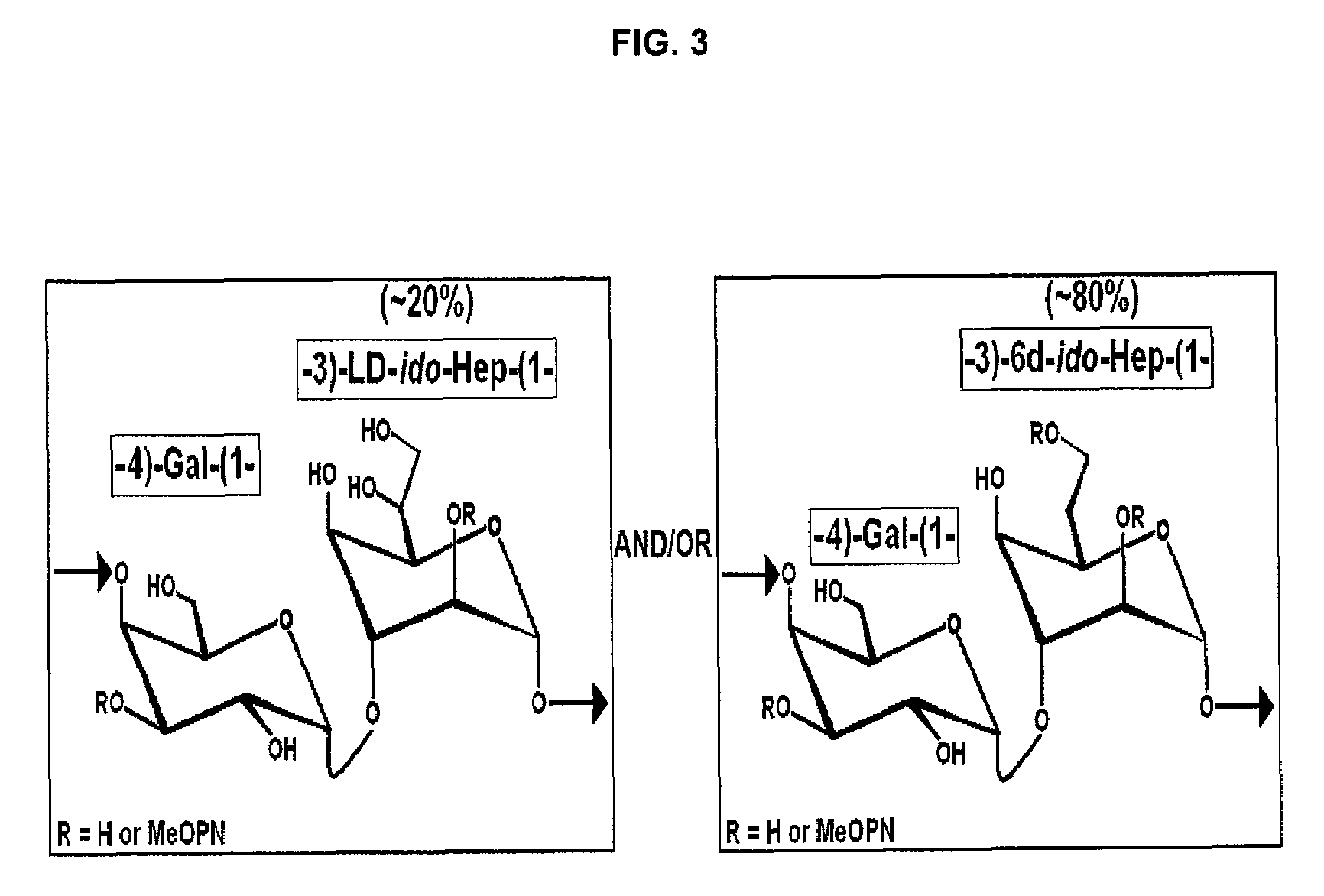Capsule composition for use as immunogen against Campylobacter jejuni
a technology of immunogen and capsule composition, which is applied in the field of immunogen against campylobacter jejuni, can solve the problems of limited vaccine strategies against i>c. jejuni /i>, no licensed vaccines, and surprisingly little understanding of how i>c. jejuni /i>causes human diseas
- Summary
- Abstract
- Description
- Claims
- Application Information
AI Technical Summary
Benefits of technology
Problems solved by technology
Method used
Image
Examples
example 1
Immunity to Capsule—can be Increase by Conjugation to Carrier Molecules
[0030]Since IgG response is often predominantly observed as a T-cell independent immune response. Therefore, children are typically only capable of mounting an IgM response in the face of polysaccharide antigens with adults capable of generating an IgG, IgA and IgM response.
[0031]In order to potentially further improve the response to capsule moieties, the immunogenicity of C. jejuni capsule can be conjugated to T-dependent carrier proteins.
[0032]Conjugation of C. jejuni strain BH0142 capsular polysaccharide to a carrier protein, such as cross reacting material 197 (CRM197), can be achieved by selectively oxidizing the exocyclic glycero moiety, with periodate, of one or more L-glycero-D-ido-heptose units present in each capsular polysaccharide. Analysis (FIG. 4) of the activated (oxidized) C. jejuni strain BH0142 capsular polysaccharide revealed that indeed L-glycero-D-ido-heptose could be selectively oxidized to...
example 2
Immunogenicity of the CG8486 Capsule Conjugate Vaccine (CPS8486-CRM197)
[0034]Mice were immunized with 3 doses of either 1, 5 and 25 micrograms of the capsule conjugate from CG8486 subcutaneously at four-week intervals. Blood samples were collected immediately before each vaccination and at 4, 8, 12 and 14 weeks after the third vaccination. The CPS8486 IgG titers were determined by ELISA. Animals receiving PBS showed baseline levels of CPS8486-specific IgG titer (geometric endpoint titer 3.4±0.40). The titers of immunized animals are shown in Table 2. Immunization with 1 μg of CG8486 capsule conjugate vaccine failed to induce CPS8486-specific IgG. In contrast, animals immunized with 5 and 25 μg of vaccine had similar high levels of antigen-specific serum IgG after two doses. Delivery of the third dose of 5 μg of vaccine further enhanced IgG levels, but vaccination with the third dose of 25 μg of vaccine did not. The peak levels of IgG titers in the groups that received 5 μg and 25 μg...
example 3
Protective Efficacy of CPS8486-CRM197 in an Intranasal Mouse Model of C. jejuni Infection
[0036]To determine the ability of the CG8486 capsule conjugate vaccine to protect against homologous challenge in the mouse intranasal model of infection (FIG. 6), animals immunized with 5 or 25 μg of the CG8486 capsule conjugate vaccine or PBS at 4-week intervals were challenged intranasally with C. jejuni strain CG8486. The illness indices were calculated as described in the figure legend. Vaccinated animals never reached the same level of disease severity as that seen with control animals. On days 1 and 1.5 after challenge, animals immunized with 25 μg showed significantly lower sickness than controls or the recipients of 5 μg (p<0.05), although severity of sickness increased until day 3. Three days after challenge animals immunized with either dose of the vaccine showed significantly lower sickness indices than controls (p=0.05). The mean sickness index returned to normal by day 4.5 (25 μg) ...
PUM
| Property | Measurement | Unit |
|---|---|---|
| average molecular weight | aaaaa | aaaaa |
| molecular weight | aaaaa | aaaaa |
| molecular weight | aaaaa | aaaaa |
Abstract
Description
Claims
Application Information
 Login to View More
Login to View More - R&D
- Intellectual Property
- Life Sciences
- Materials
- Tech Scout
- Unparalleled Data Quality
- Higher Quality Content
- 60% Fewer Hallucinations
Browse by: Latest US Patents, China's latest patents, Technical Efficacy Thesaurus, Application Domain, Technology Topic, Popular Technical Reports.
© 2025 PatSnap. All rights reserved.Legal|Privacy policy|Modern Slavery Act Transparency Statement|Sitemap|About US| Contact US: help@patsnap.com



